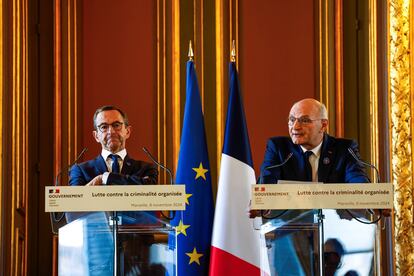France declares war on drug trafficking with a special plan to reduce crime
In Marseille, the epicenter of drug trafficking gangs, the Ministers of Justice and Interior presented a project to prevent the ‘Mexicanization’ of the country, which includes the appointment of a liaison magistrate in Bogotá

France has officially declared war on drug trafficking and organized crime, a scourge that in recent months has spread with unprecedented virulence and violence to the outskirts of many of the country’s cities. Marseille, the epicenter of this type of gang activity and an example of a city increasingly degraded by the phenomenon, was the setting chosen by Interior Minister Bruno Retailleau and Justice Minister Didier Migaud to present a special plan against what the head of French security last week described as the “Mexicanization” of France. The ministers announced the creation of a liaison magistrate position in Bogotá, Colombia, and the reform of the system to provide greater protections and guarantees to those who cooperate with the authorities. It is not the first time that France has promised to end the problems in Marseille, a city of 1.5 million inhabitants, including the metropolitan area, and the second-largest in the country.
The security situation has reached unprecedented levels even by the standards of crime in some French cities. A month ago in Marseille, a minor was stabbed more than 30 times and then burned in a metal drum while still alive. The murder marked a turning point in the fight against gang activity, but the trickle of killings and shootings continued, including an incident at a police station in Cavaillon, 50 kilometres (31 miles) from Marseille, where the DZ Mafia, the organization that controls drug trafficking in the city, set fire to four of the vehicles that were parked outside in retaliation for an operation in which the authorities had seized a cache of drugs.
The ministers sought to convey a message of extreme firmness in the fight against the gangs, evoking a war comparable to that being waged against terrorism. Migaud stressed that drug trafficking is “an existential threat to institutions, to democracy” and that “it threatens the fundamental interests of the nation.” As such, he said that action against drug trafficking is “a national cause” that “will take years.” It is a fight that will “probably last 10, 15 or 20 years,” but “it can be won,” he said. “My hand will not tremble in mobilizing the entire judicial apparatus,” Migaud added before announcing that the teams at the Paris Prosecutor’s Office dedicated to organized crime will be reinforced with 40% more personnel, and that four more judges will be assigned in the capital to speed up judicial processes.
France is looking in Italy’s mirror and wants to address the issue in the same way as terrorism, or the crusade against the mafia. To this end, Migaud spoke of the creation of a special prosecutor’s office for gang-related crimes and a new system for the handling of informants and state witnesses of the type that was introduced in Italy during the Cosa Nostra’s bloodiest period, and which allowed legendary magistrates such as Giovanni Falcone to put the Sicilian criminal organization in check. Only through the testimony of those who decide to collaborate with the authorities has it been possible to make advances in dismantling these organizations.
42 murders in six months
Cities with gang and drug-trafficking problems are spread across France, from Grenoble to Poitiers, Lyon, and Paris itself. In the first half of the year, 42 deaths were attributed to drug-related murders. But Marseille is experiencing another serious crime wave. After a record 49 shooting deaths in 2023, the toll this year stands at 19 so far. The city’s public prosecutor, Nicolas Bessone, intervened in the public debate a few weeks ago and described the latest crimes as “unprecedented savagery.” The magistrate, who coined the term “narcoicide” to describe the killings in Marseille, estimated the number of drug-dealing hotspots in the city at 128 and spoke of a “total loss of reference points.” The new plan calls for the appointment of 25 additional investigators and the reinforcement of the police presence on public roads with 95 additional officers.
The Interior Minister presented other measures that the government intends to push forward, such as authorizing prefects to order the closure of businesses suspected of being used to launder drug money, requiring proof of the origin of funds used for the purchase of vehicles, or a mechanism for quickly freezing the assets of criminals.
The problem is this is not the first time that France has looked to Marseille to combat this phenomenon, without achieving much success. Three years ago, President Emmanuel Macron himself travelled to the city to present an investment and rehabilitation plan worth €1.5 billion ($1.6 billion) to restore normality. Today, many of the planned projects, local associations complain, have still not been implemented.
Sign up for our weekly newsletter to get more English-language news coverage from EL PAÍS USA Edition
Tu suscripción se está usando en otro dispositivo
¿Quieres añadir otro usuario a tu suscripción?
Si continúas leyendo en este dispositivo, no se podrá leer en el otro.
FlechaTu suscripción se está usando en otro dispositivo y solo puedes acceder a EL PAÍS desde un dispositivo a la vez.
Si quieres compartir tu cuenta, cambia tu suscripción a la modalidad Premium, así podrás añadir otro usuario. Cada uno accederá con su propia cuenta de email, lo que os permitirá personalizar vuestra experiencia en EL PAÍS.
¿Tienes una suscripción de empresa? Accede aquí para contratar más cuentas.
En el caso de no saber quién está usando tu cuenta, te recomendamos cambiar tu contraseña aquí.
Si decides continuar compartiendo tu cuenta, este mensaje se mostrará en tu dispositivo y en el de la otra persona que está usando tu cuenta de forma indefinida, afectando a tu experiencia de lectura. Puedes consultar aquí los términos y condiciones de la suscripción digital.









































